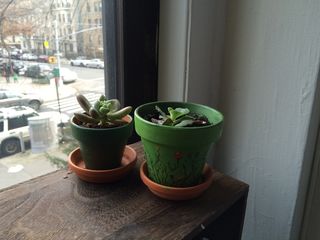Career
Everything You Didn't Do in 2016
Why honoring unfinished work is as important as celebrating accomplishments.
Posted December 30, 2016
This year, for our annual holiday party, my colleagues and I took a class at CraftJam, a sunny space in Manhattan where you can relive the Arts and Crafts part of the summer camp experience. We were given supplies and instructions for painting two little terra cotta pots per person to plant succulents in. We could paint whatever we wanted—and that’s where my trouble started.
You’d better get this right or everybody will judge you, the shadowy critical part of my brain piped up immediately. You know you’re bad at crafts and following instructions. Don’t screw this up.
My coworkers were all having fun, drinking wine and painting away, while that shadowy part of me was turning my afternoon into some kind of Martha Stewart Hunger Games.
I am bad at crafts, I thought, wondering whether anybody would notice if I walked out of there with two succulents in two unadorned pots. I can’t make something precise or clean or perfect.
Finally, a wiser part of me spoke up. So make it messy, it said.
I grabbed a brush with hairs no thicker than a bundle of eyelashes. I didn’t try to follow any of the instructions or create a pattern—I just improvised. And once I started painting for the pleasure of it, the sounds of the party became faint background music, I stopped chatting with my colleagues, and I became completely focused.
This is what the psychologist Mihaly Csikszentmihalyi calls “flow,” what author David Rakoff described as “a kind of blissful absence of the self and a loss of time.” Athletes experiences this often, and artists, but we all have ways of finding it. It’s not a feeling that’s available on-demand, but once experienced, it leaves you wanting only to have it again.
I was so ensconced in flow that I kept painting until it was time to pack up and leave. I was fretting about not having time to decorate my second pot when one of my colleagues stepped up to take a look at my handiwork.
“One with flowers and one just solid green?” he said. “That’s perfect. So classy.”
Both pots now sit in my window—the one I painted in a state of utter flow, and the one I ran out of time to paint. I could probably finish the second pot at home; I’m sure I’ve got some paints and brushes stashed away somewhere. But I decided I’d rather leave it unfinished.
The first one reminds me that, when we get out of our own way and allow ourselves to become truly absorbed in our work out of sheer love for it, we can surprise ourselves with what we create and with how much we enjoy doing so.
The second one reminds me that there is value in unfinished work. That sometimes what we see as a mess can look like, from an outside perspective, exactly what was intended all along.
As 2016 draws to a close, there is much work being left unfinished. Maybe you didn’t complete the draft of your novel, or that revision you were certain you’d knock out by year’s end. Maybe the dramatic times we’ve been living in since November threw you out of your flow state and disrupted the schedule you planned, or diverted your attention to projects of social action that also remain incomplete. Maybe life just got in the way of art, as it so often does.
That’s okay. Celebrate the work you did and honor the work not yet done. Your unfinished work’s gift for you is possibility, and the potential and hope that lie in possibility are a welcome balm for us all. As 2016 ends, cherish how pregnant with that possibility your incomplete work is. Spend these last days of the year restoring yourself—your psyche, your creativity, your zeal. Let this be a time to appreciate what you’ve done and what you’ve yet to do.
And what you’ve yet to do—what you’re capable of in 2017—is worth celebrating.



